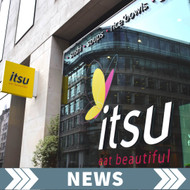The Future of Fast Food: Itsu's Tech-Driven Strategy Amid Wage Increases
Posted by Emily on 18th Dec 2024 Reading Time:
In the bustling heart of London's Oxford Street, where the cost of doing business is sky-high, the founder of Itsu, Julian Metcalfe, is not one to shy away from challenges. The entrepreneur, who revolutionised lunching habits with Pret A Manger and then Itsu, has now set his sights on a new frontier: technology to combat rising employment costs.
Metcalfe, a visionary in the food industry, has expressed concerns over increasing staff wages, potentially reaching £16 per hour. In response, Itsu is integrating more technology into its operations. Self-service kiosks are now a common sight, a direct response to what Metcalfe describes as the government's relentless increase in employment taxes. These machines handle customer orders, significantly reducing the need for human labour in the front of house.
In the kitchens, the scene is even more futuristic. Itsu employs three Japanese robots per location, each designed to perform tasks that would otherwise require human hands. These robots, costing £100,000 each, work tirelessly without needing holidays or remote working arrangements. This strategy keeps costs down and ensures consistency and efficiency in food preparation.
Despite these technological advancements, Metcalfe remains committed to his workforce. He acknowledges the positive aspect of higher employee wages but balances this with the need to keep Itsu's offerings affordable. His vision for Itsu is clear: to provide nutritious, affordable food, challenging the dominance of fast food giants with healthier alternatives.
The broader implications of this shift towards automation are significant. With both Pret and Itsu employing over 10,000 people in the UK, changes in employment policy, like the recent increase in National Insurance contributions from 13.8% to 15%, directly affect their business models. Yet, Metcalfe's ambition doesn't stop at British shores; he envisions expanding Itsu to 500 sites in the next decade, with aspirations of reaching thousands, including markets like Japan and China.
This blend of technology and human touch at Itsu reflects a response to economic pressures and a broader industry trend towards automation. It raises thought-provoking questions about the future of work, the balance between technology and human employment, and how businesses can maintain quality and affordability in an era of rising costs.
Metcalfe's approach also highlights a call for long-term thinking in business, contrasting with what he perceives as short-term policy decisions by the government. His passion for detail and innovation, from perfecting noodle recipes to ensuring the correct font size on menus, underscores a commitment to quality that transcends mere profit-making.




